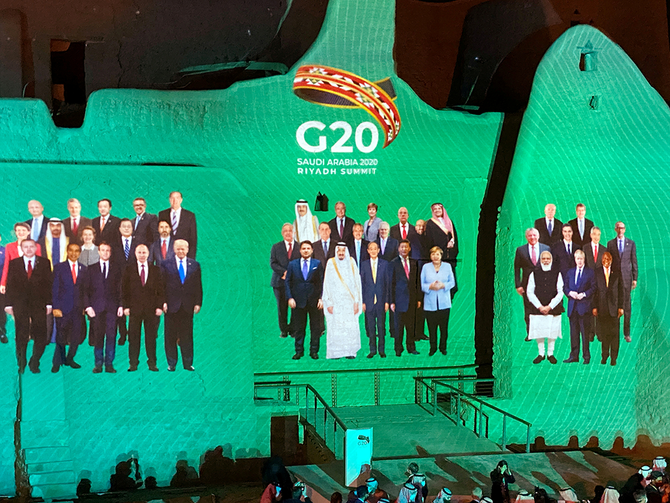
- ARAB NEWS
- 11 Jul 2025

If ever there was a need for global cooperation and multilateral approaches, it is now, after the coronavirus (COVID-19) pandemic threatened lives and livelihoods the world over and wiped $12 trillion off the global economy.
To that end, the G20 Summit was really important, because the organization represents economic muscle and can have real impact. It is composed of the world’s most powerful economies — comprising 90 percent of global GDP (over 75 percent of global GDP if intra-EU trade is excluded) and two-thirds of the world’s population.
Saudi Arabia is the only Arab member and one of only three Muslim majority member states. The presidency was a watershed for Saudi Arabia’s status among the powerful nations of the world, and the country proved its leadership acumen.
This year catapulted the world into the biggest recession since the Second World War. Meetings had to take place virtually, adding an extra layer of complexity as leaders and Sherpas could not have their bilateral conversations over coffee on the margin of gatherings. These informal conversations are instrumental in socialising ideas and reaching consensus.
The summit nonetheless produced tangible results and a communique which was approved by all 20 participants, which cannot be taken for granted at such gatherings.
The three major topics were the pandemic and vaccines, the economic fallout of the pandemic, and the debt service suspension initiative (DSSI), as well as sustainability and climate change.
The leaders pledged to “spare no effort to ensure their (vaccines) affordable and equitable access for all people, consistent with members’ commitments to incentivize innovation.” This is important, because quite apart from the human tragedy of the pandemic, the global economy can only revert to normal once the spread of the virus is halted everywhere.
While the intentions expressed are noble, the world still needs to raise $24 billion in 2021 to fight COVID-19. The world’s most powerful nations have so far bought up most of the available doses of the Pfizer/BionTech and Moderna vaccines. If they are serious about walking the walk, they will need to share going forward.
The economic outcome was not so straightforward. While the leaders stressed the need for collaboration, they still left the various stimulus packages fully in the purview of the various member countries. When it came to the DSSI, the G20 already had real success in March when 73 countries were given the option to suspend payment of interest and principal. So far, 46 countries have availed themselves of the program, which was extended through June 2021 in mid-November.
The virtual G20 Summit in Riyadh was a testament to multilateral cooperation. It also showcased the leadership capability of the Kingdom on the global stage.
Cornelia Meyer
The DSSI is important, especially as it also extends to the Paris Club of bilateral lenders. However, it does not extend to private sector debt, wherein lies a problem, because many of these countries are heavily indebted to private sector financial institutions, who have so far not participated in the DSSI — despite the explicit request by the G20. China is of particular concern, because it classifies its policy banks as belonging to the private sector. They have huge loans outstanding in developing countries across the world.
An ideal world leader would have agreed to expand the stock of IMF SDRs to $1 trillion. The US has vetoed the proposal for some time. Multilateral meetings are the art of the possible where no one ever achieves everything they want. The issuance of SDRs remains on the table and will in all likelihood come to fruition later.
The summit looked beyond the immediate threat of the pandemic to the major topic shaping the future: Sustainability. In a side event titled “Safeguarding the Planet,” global leaders joined King Salman to discuss climate change and sustainability. Except for the US intervention, there was broad consensus on the importance of the Paris Agreement on Climate Change and all the leaders pledged to work toward climate neutrality. They all expressed their goals and how they intended to reach them in their own ways. The Saudi approach was particularly interesting, because the Kingdom understands like no other the importance of achieving sustainability goals while still ensuring world energy supplies remain reliable, affordable and accessible to all. To this effect, the circular carbon economy, which aims to reduce, reuse, recycle and remove carbon was widely discussed and supported by the communique.
Other topics of the leader’s declaration included the stability of the financial architecture, reaching agreement on international taxation of multinationals and support of the multilateral trading system. The Riyadh initiative for the reform of the World Trade Organization was given a special mention.
Whatever one thinks about the G20 and multilateral mechanisms, it is evident that the world would be in a much worse place, if it was not for global cooperation on vaccines, coordination on stimulus packages, the DSSI and collaborating on ways to combat climate change. The virtual G20 Summit in Riyadh was a testament to multilateral cooperation. It also showcased the leadership capability of the Kingdom on the global stage.
• Cornelia Meyer is a Ph.D.-level economist with 30 years of experience in investment banking and industry. She is chairperson and CEO of business consultancy Meyer Resources. Twitter: @MeyerResources